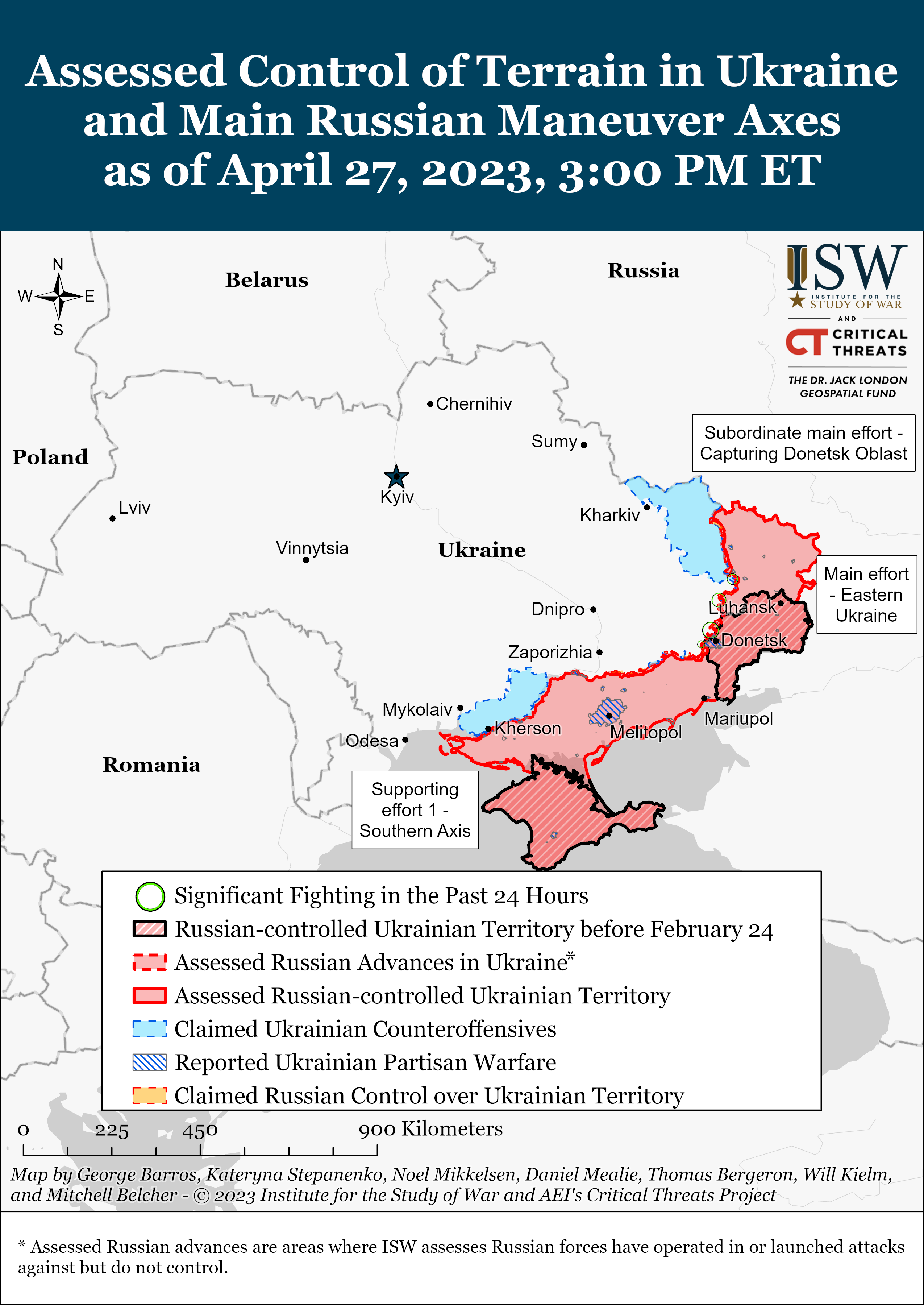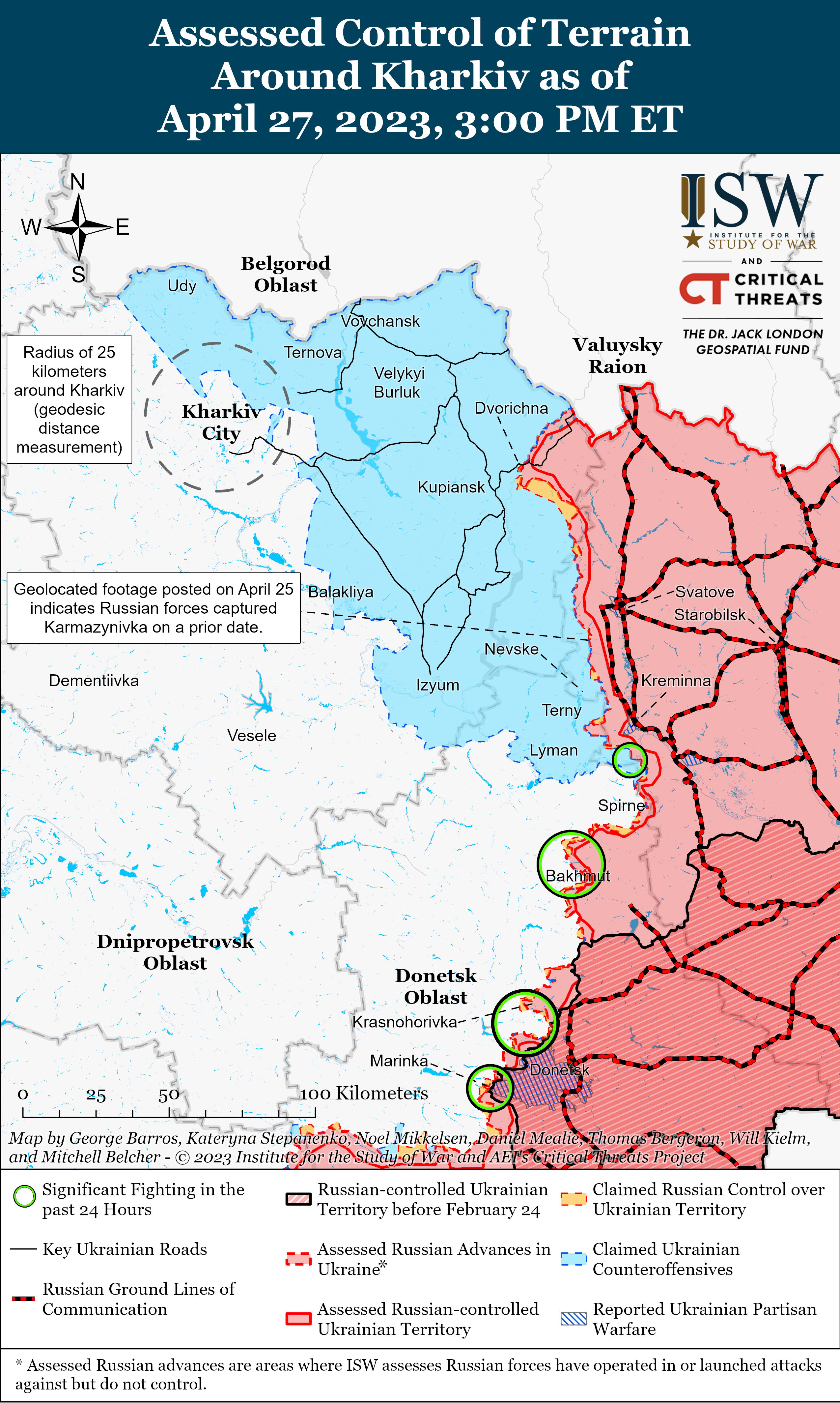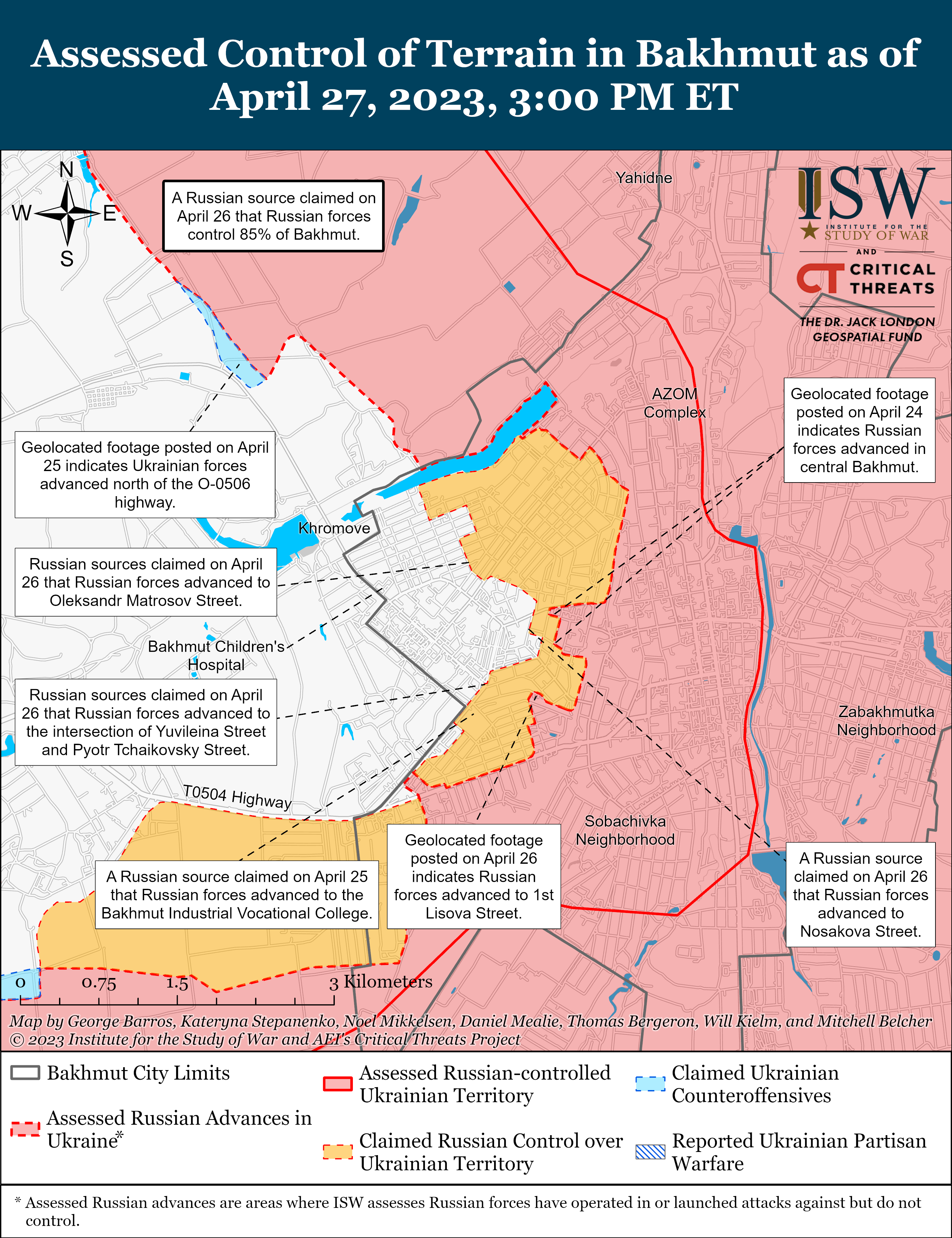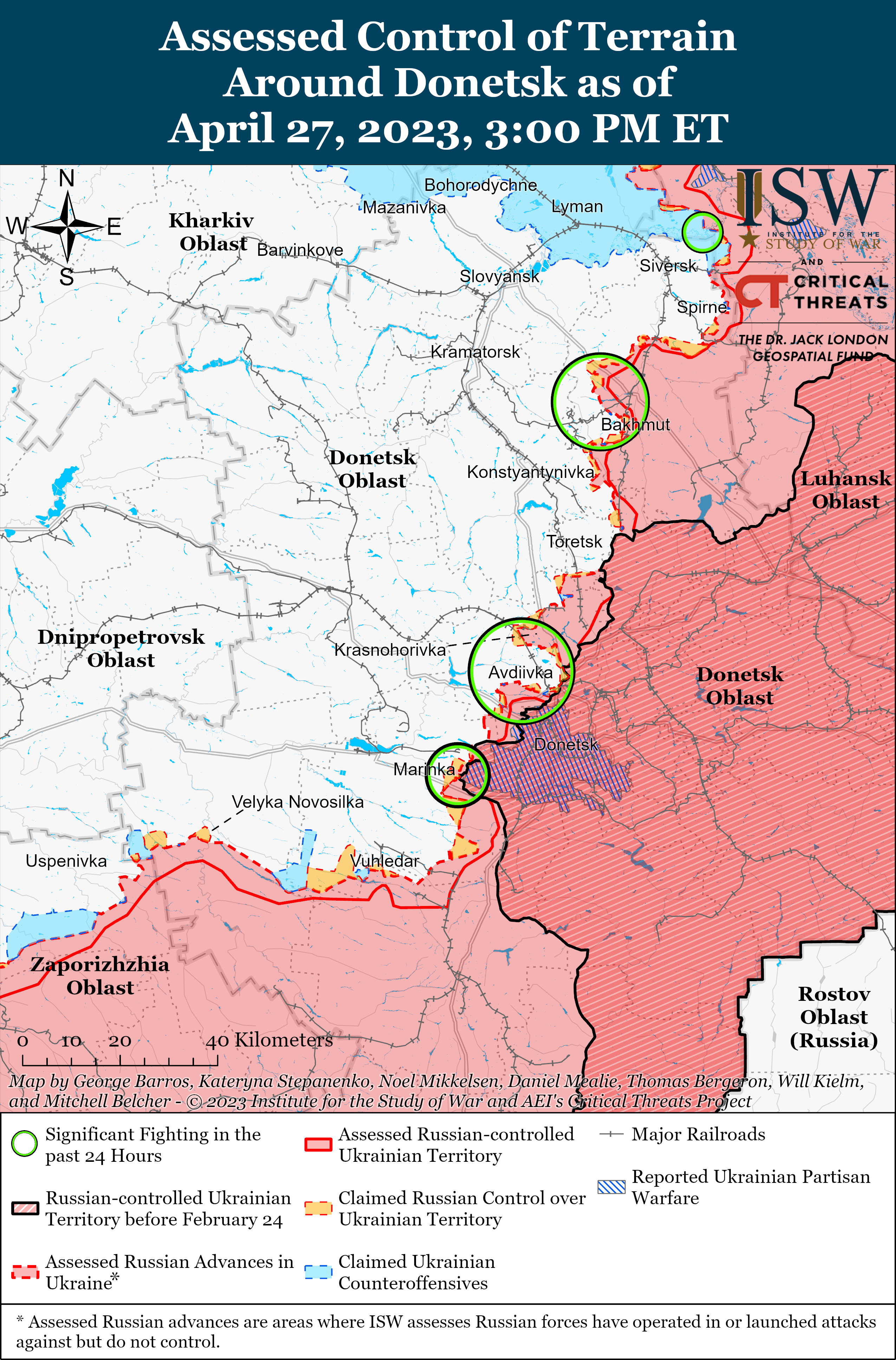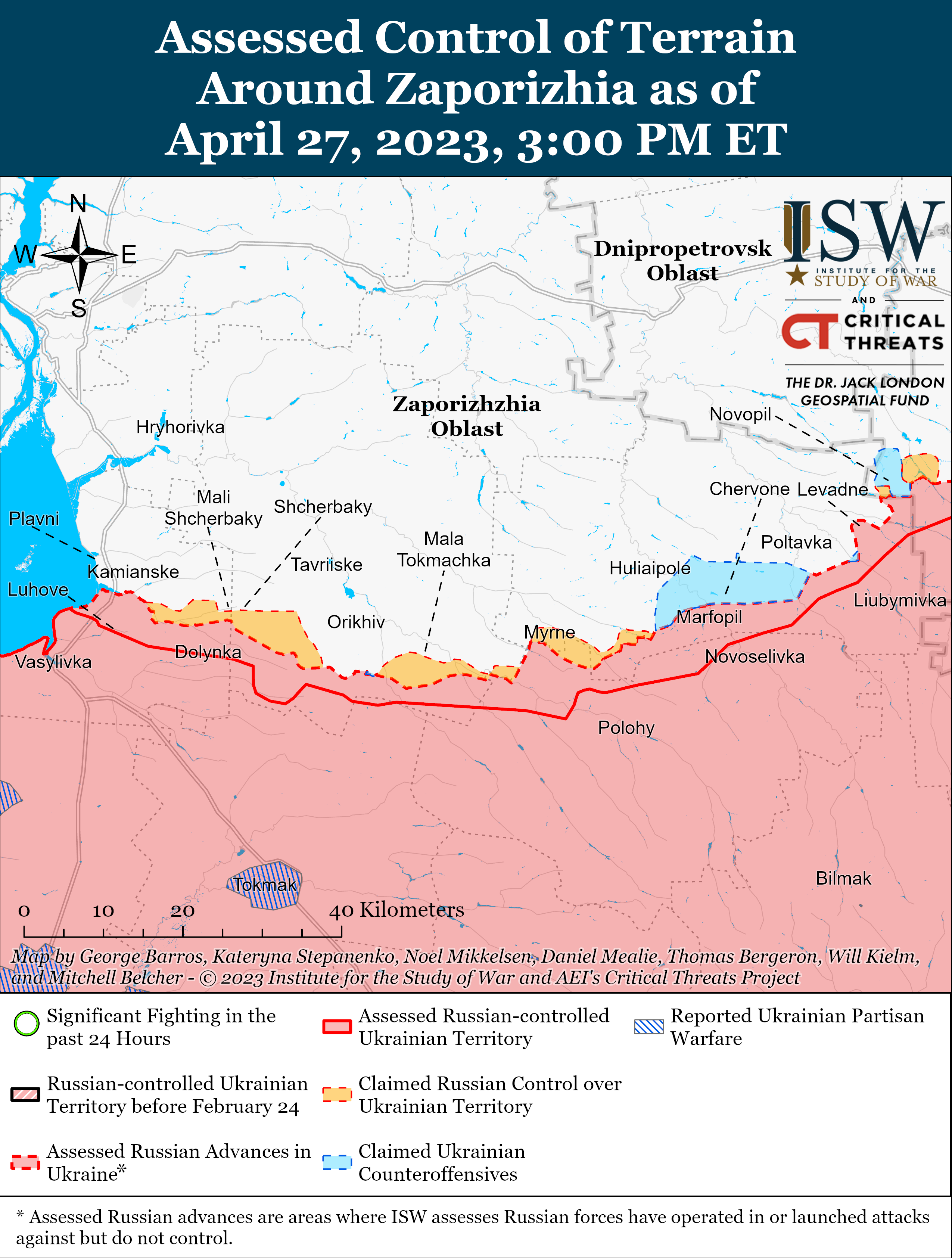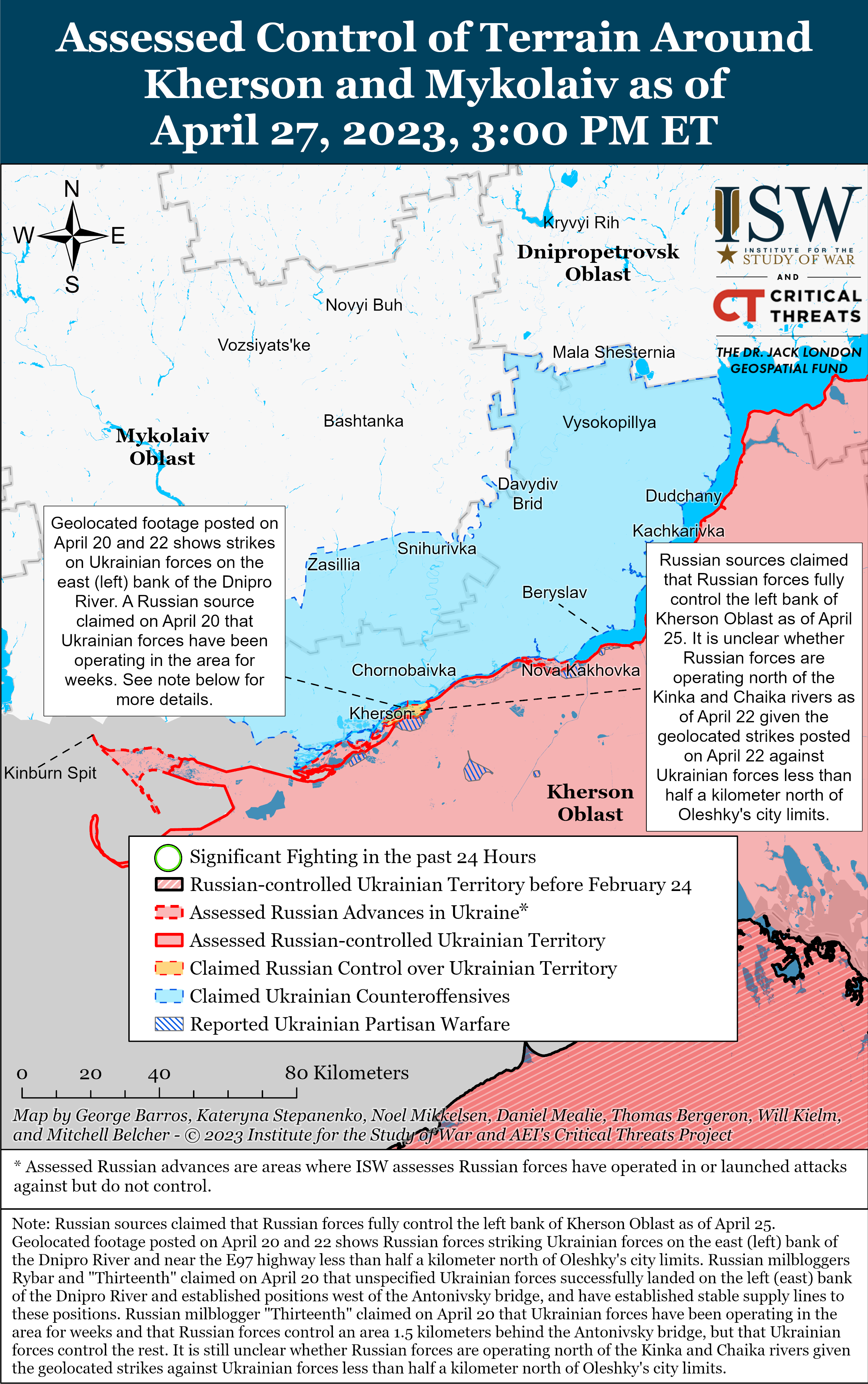 |
 |
Russian Offensive Campaign Assessment, April 27, 2023

Russian Offensive Campaign Assessment, April 27, 2023
Karolina Hird, Grace Mappes, Riley Bailey, Angela Howard, Layne Philipson, and Frederick W. Kagan
April 27, 3:30pm ET
Click here to see ISW’s interactive map of the Russian invasion of Ukraine. This map is updated daily alongside the static maps present in this report.
Click here to access ISW’s archive of interactive time-lapse maps of the Russian invasion of Ukraine. These maps complement the static control-of-terrain map that ISW produces daily by showing a dynamic frontline. ISW will update this time-lapse map archive monthly.
The Russian military command appears to be reshuffling the leadership of command organs associated with force generation, sustainment, and logistics. Several prominent Russian milbloggers claimed on April 27 that Colonel General Aleksey Kuzmenkov, Deputy Head of the Russian National Guard (Rosgvardia), has replaced Colonel General Mikhail Mizintsev as Deputy Defense Minister of the Russian Federation for Logistics.[1] A Wagner-affiliated milblogger claimed that Mizintsev’s dismissal may be a result of a combat readiness check of troops of the Northern Fleet carried out by former commander of the airborne (VDV) forces and Wagner affiliate Colonel General Mikhail Teplinsky, who was recently re-appointed to an unspecified command role in Ukraine.[2] The milblogger claimed that Teplinsky’s inspection revealed that troops in certain places of the front were not receiving necessary weapons.[3] The Wagner Group has experienced significant issues with dealing with the Russian logistics enterprise, and Teplinsky’s reported role in identifying issues with supply may portend a renewed focus of Russian sustainment organs on providing Wagner with necessary logistical support, as Teplinsky’s affiliations with Wagner are well-established.[4] ISW previously reported on September 24, 2022, that Mizinstev replaced Army General Dmitry Bulgakov as Head of Logistics and that Mizintsev previously was the head of the Russian National Defense Control Center and oversaw command of the 150th Motorized Rifle Division (8th Combined Arms Army, Southern Military District) during Russian operations in Mariupol in spring 2022.[5] Russian milbloggers additionally reported that former Head of the 8th Directorate of the Russian General Staff (State Secret Protection) Yuri Kuznetsov will become Head of the Main Directorate of Personnel of the Russian Ministry of Defense and that Stanislav Gadzhimagomedov, Deputy Chief of the Main Operational Department of the Russian General Staff will replace General Oleg Gorshenin as Head of the National Defense Control Center.[6] Official Russian sources have not yet confirmed these changes.
The three command organs that are reportedly receiving new leadership as part of this reshuffle are noteworthy because they are associated with managing aspects of Russian force generation, troop sustainment, and logistical oversight. The Russian National Defense Control Center is the body responsible for coordinating the actions of the Russian Armed Forces and is essentially the nerve center of the entire Russian Ministry of Defense (MoD). Alongside the coordination actions of the National Defense Control Center, the organs responsible for personnel and logistical oversight facilitate critical troop sustainment functions. The Russian General Staff may be scrambling to enact these changes as fear over a Ukrainian counteroffensive mounts in the Russian information space. These changes also suggest that existing commanders in charge of these functions failed to properly facilitate Russia’s winter offensive, which has largely culminated without making substantial gains. However, these changes are unlikely to effectively set conditions for Russian forces to respond to a Ukrainian counteroffensive in a timely manner. These changes may be part of a wider effort to reform and formalize the Russian Armed Forces over the long term.
Western officials expressed confidence in Ukraine’s ability to conduct a successful counteroffensive. NATO Secretary General Jens Stoltenberg stated on April 27 that NATO has trained and equipped more than nine new Ukrainian brigades, emphasizing that Ukrainian forces are in a “strong” position to retake captured territory in their upcoming counteroffensive.[7] Stoltenberg also stated that NATO and its partners have delivered over 98 percent of promised combat vehicles to Ukraine, totaling over 1,550 armored vehicles, 230 tanks, and other unspecified equipment.[8] US European Command (EUCOM) Commander General Christopher Cavoli stated that the US has been working closely with Ukrainian forces to develop a counteroffensive plan, including developing techniques to surprise Russian forces.[9]
Russian forces are reportedly using new tactics to complicate Ukrainian air defenses’ ability to detect Russian missiles. Russian forces conducted four Kalibr missile strikes on Mykolaiv City on April 27, and Ukrainian sources reported that Russian forces directed the missiles using different terrain features, different heights of launches, and multiple trajectory changes to complicate their detection by Ukrainian air defenses.[10] The Russian Ministry of Defense (MoD) acknowledged that Russian forces conducted a sea-based, long-range, high precision missile strike on April 27, following its recent notable silence about Russian missile and air strikes as part of its broader missile campaign in Ukraine.[11] ISW previously assessed that Russia‘s missile campaign to degrade Ukraine‘s unified energy infrastructure definitively failed and that Russian forces appear to have abandoned the effort.[12] Russian forces maintain the capability to renew their missile campaign if they desire, and Russian forces may employ these tactics in order to conserve their stocks of high precision missiles in the event of a renewed missile campaign.
Chechen Republic Head Ramzan Kadyrov appears to have launched a renewed campaign for national attention. Kadyrov publicized that he met with several prominent Russian officials – including Russian National Guard Federal Service Director Viktor Zolotov, Security Council Secretary Nikolai Patrushev, Presidential Administration Head Anton Vaino, and Federal Security Service (FSB) Director Alexander Bortnikov – on April 26. Kadyrov claimed that he discussed topics including relations between Russian regions and the federal government with Bortnikov and that Bortnikov thanked him personally for the stable situation in Chechnya.[13] Kadyrov also continues to draw heavily on Chechen soldiers’ role in Ukraine to bolster his own image. Kadyrov claimed on April 26 that Chechen Akhmat-1 Special Purposes Mobile Unit (OMON) security officers with extensive combat experience departed to replace their comrades in Ukraine.[14]
Belarusian Defense Minister Viktor Khrenin met with Chinese Defense Minister Li Shangfu and Iranian Defense Minister Mohammad Reza Ashtiani in New Delhi, India on April 27.[15] Belarus’s ongoing efforts to build relationships with countries that have either supported or not condemned Russia’s war in Ukraine likely aim to build a coalition of non-Western countries and deepen pathways to help Russia evade Western sanctions, on which ISW has previously reported.[16] The Belarusian Ministry of Defense (MoD) stated that Khrenin and Li discussed the status of an “all-weather” comprehensive strategic partnership between Belarus and China as well as prospects for cooperation in military and general spheres.[17] The Belarusian MoD’s mention of an “all-weather” partnership closely mirrors Russian efforts to frame the Sino-Russian relationship as a “no limits” partnership despite existing Chinese reservations. The Belarusian MoD stated that Khrenin and Ashtiani noted the existence of “significant potential and prospects” to strengthen military contracts and increase practical cooperation.[18]
Key Takeaways
- The Russian military command appears to be reshuffling the leadership of command organs associated with force generation, sustainment, and logistics.
- The three command organs that are reportedly receiving new leadership as part of this reshuffle are noteworthy because they are associated with managing aspects of Russian force generation, troop sustainment, and logistical oversight.
- Western officials expressed confidence in Ukraine’s ability to conduct a successful counteroffensive.
- Russian forces are reportedly using new tactics to complicate Ukrainian air defenses’ ability to detect Russian missiles.
- Chechen Republic Head Ramzan Kadyrov appears to have launched a renewed campaign for national attention.
- Belarusian Defense Minister Viktor Khrenin met with Chinese Defense Minister Li Shangfu and Iranian Defense Minister Mohammad Reza Ashtiani in New Delhi, India on April 27.
- Russian forces conducted defensive operations in the Kupyansk direction and limited ground attacks near Kreminna.
- Russian forces did not make any confirmed gains in or around Bakhmut but may be transferring additional reserves to the Bakhmut area.
- Russian forces continued offensive operations along the Avdiivka-Donetsk City line.
- Russian forces are further militarizing the Zaporizhzhia Nuclear Power Plant (ZNPP) to defend against possible Ukrainian counteroffensive operations.
- The Washington Post reported that leaked US intelligence documents state that Russian military leaders aim to enlist 815,000 soldiers while balancing concerns about critical labor shortages.
- Ukrainian partisans conducted three separate attacks in occupied territories on April 26-27.
We do not report in detail on Russian war crimes because these activities are well-covered in Western media and do not directly affect the military operations we are assessing and forecasting. We will continue to evaluate and report on the effects of these criminal activities on the Ukrainian military and the Ukrainian population and specifically on combat in Ukrainian urban areas. We utterly condemn these Russian violations of the laws of armed conflict, Geneva Conventions, and humanity even though we do not describe them in these reports.
- Russian Main Effort – Eastern Ukraine (comprised of two subordinate main efforts)
- Russian Subordinate Main Effort #1 – Capture the remainder of Luhansk Oblast and push westward into eastern Kharkiv Oblast and encircle northern Donetsk Oblast
- Russian Subordinate Main Effort #2 – Capture the entirety of Donetsk Oblast
- Russian Supporting Effort – Southern Axis
- Russian Mobilization and Force Generation Efforts
- Activities in Russian-occupied areas
Russian Main Effort – Eastern Ukraine
Russian Subordinate Main Effort #1 – Luhansk Oblast (Russian objective: Capture the remainder of Luhansk Oblast and push westward into eastern Kharkiv Oblast and northern Donetsk Oblast)
Russian forces conducted defensive operations in the Kupyansk direction on April 27. The Russian Ministry of Defense (MoD) claimed that elements of the Russian Western Group of Forces (Western Military District) destroyed four Ukrainian sabotage and reconnaissance groups near Novoselivkse (30km southeast of Kupyansk), Vilshana (15km northeast of Kupyansk), and Krokhmalne (25km southeast of Kupyansk).[19] A Russian milblogger remarked that the situation in the Kupyansk direction has not changed significantly and that mutual artillery strikes and reconnaissance operations are occurring along the line of contact.[20] The Ukrainian General Staff reported that Russian forces in the Kupyansk direction did not conduct any offensive actions and are continuing to fortify their positions and use UAVs to adjust artillery fire.[21]
Russian forces conducted a limited ground attack in the Kreminna area on April 27. The Ukrainian General Staff reported that Russian forces conducted unsuccessful offensive operations in the direction of the Serebrianska forest area (10km south of Kreminna).[22] Russian milbloggers claimed that Russian forces continued positional battles northwest of Kreminna near the Zhuravka gully and near Makiivka (23km northwest of Kreminna).[23]
Russian Subordinate Main Effort #2 – Donetsk Oblast (Russian Objective: Capture the entirety of Donetsk Oblast, the claimed territory of Russia’s proxies in Donbas)
Russian forces did not make any confirmed gains in or around Bakhmut on April 27. The Ukrainian General Staff reported that Russian forces continued to attack within Bakhmut, and Ukrainian forces repelled Russian ground attacks near Orikhovo-Vasylivka (11km northwest of Bakhmut), Bohdanivka (5km northwest of Bakhmut), and Ivanivske (6km west of Bakhmut).[24] A milblogger claimed on April 27 that Wagner forces reached the main entrance to Bakhmut from Khromove (immediately west of Bakhmut) and Ivanivske and cut the main but not final Ukrainian logistics line into Bakhmut, but ISW cannot confirm this claim.[25] One Russian milblogger claimed that Wagner Group forces broke through Ukrainian lines near Khromove, but another claimed that Wagner forces have not yet entered the settlement.[26] The Russian Ministry of Defense (MoD) claimed that Wagner Group assault detachments captured four unspecified blocks in northwestern, western, and southwestern Bakhmut.[27]
Russian forces may have relocated Eastern Military District (EMD) elements to reinforce the Wagner Group in the Bakhmut direction. A Russian milblogger claimed on April 26 that the Russian 305th Artillery Brigade (5th Combined Arms Army, Eastern Military District) has been operating in the Bakhmut area for the past month, which is the first mention of EMD presence near Bakhmut.[28] 5th Combined Arms Army elements may have recently operated along the Zaporizhia Oblast frontline, and other EMD elements have suffered major losses near Vuhledar in western Donetsk Oblast.[29] Neither the Russian Ministry of Defense (MoD) nor Wagner Group financier Yevgeny Prigozhin have confirmed EMD activity in this area.\
Russian forces continued to conduct ground attacks along the Avdiivka-Donetsk City line on April 27. The Ukrainian General Staff reported that Ukrainian forces repelled Russian ground attacks near Avdiivka, Sieverne (5km west of Avdiivka), Pervomaiske (11km southwest of Avdiivka), Krasnohorivka (22km southwest of Avdiivka), and Marinka (27km southwest of Avdiivka).[30] Russian milbloggers claimed on April 26 that Russian forces made marginal advances near the railway north of Avdiivka, the southwestern approaches to Avdiivka, and near Krasnohorivka (5km north of Avdiivka).[31] The milbloggers also claimed that Russian forces attacked northeast of Vodyane (7km southwest of Avdiivka), near Nevelske (15km southwest of Avdiivka), and towards Sieverne. A Russian milblogger claimed on April 27 that Ukrainian forces conducted a limited counterattack north of Avdiivka near Krasnohorivka.[32] Donetsk People’s Republic (DNR) Head Denis Pushilin claimed that Russian forces control 50 out of 59 blocks in Marinka, and one milblogger complained that Russian forces are unable to encircle Ukrainian forces in Marinka due to inadequate counterbattery fire.[33]
Russian forces did not conduct any confirmed ground attacks in western Donetsk Oblast on April 27.[34] A Russian milblogger claimed on April 26 that Russian forces conducted positional battles in the forest belt on the outskirts of Vuhledar and in the Mykilske dacha area (4km southwest of Vuhledar).[35]
Russian Supporting Effort – Southern Axis (Russian objective: Maintain frontline positions and secure rear areas against Ukrainian strikes)
Russian forces are further militarizing the Zaporizhzhia Nuclear Power Plant (ZNPP) in order to defend against possible Ukrainian counteroffensive operations on the east (left) bank of the Kakhovka Reservoir in Zaporizhia Oblast. The United Kingdom Ministry of Defense (UK MoD) reported on April 27 that satellite imagery shows that Russian forces have constructed firing positions on the roofs of several reactor buildings at the ZNPP.[36] A Russian milblogger argued on April 27 that Russian forces needed to strengthen defensive positions at the ZNPP in preparation for Ukrainian counteroffensives and a possible Ukrainian landing on the east (left) bank in the area.[37] The milblogger called on Russian forces to strengthen defenses at the ZNPP, near Enerhodar, and along the entire east (left) bank of the Kakhovka Reservoir.[38]
Ukrainian forces continue to strike Russian logistics and concentration areas on the east (left) bank of Kherson Oblast. Ukraine’s Southern Operational Command reported on April 26 that Ukrainian forces struck Russian concentrations in Kakhovka Raion and along the entire east (left) bank of the Dnipro River.[39] Geolocated footage published on April 27 shows Ukrainian forces striking Russian positions north of Korsunka (43km northwest of Kherson City) and southwest of Rybalche (35km southwest of Kherson City) as well as a Russian observation post in Kozachi Laheri (30km east of Kherson City).[40]
Russian forces continued routine fire west of Hulyaipole and in Mykolaiv and Kherson oblasts on April 27.[41] Ukrainian sources reported that Russian forces conducted four Kalibr missile strikes on Mykolaiv City.[42]
Russian Mobilization and Force Generation Efforts (Russian objective: Expand combat power without conducting general mobilization)
The Washington Post reported on April 27 that leaked US intelligence documents state that Russian military officials are attempting to quietly enlist 815,000 soldiers without further alarming government officials concerned about critical labor shortages caused by the war.[43] The Washington Post noted that Russia is facing its worst workforce shortage in 20 years.[44] Russian news agency Interfax reported on April 26 that the Russian Federal State Statistics Service (Rosstat) stopped publishing monthly state oil production statistics.[45] This may indicate state efforts to obscure decreased production and falling revenue.
Russian authorities continue significant recruitment efforts targeting Russia’s prison population. Russian prisoners are an attractive source of reinforcements because their heavily coerced recruitment draws limited public attention due to their lack of protections and minimal present contribution to the Russian economy. The Ukrainian General Staff stated on April 27 that Russian authorities are targeting individuals with criminal records, particularly with terrorism charges, to replenish manpower losses.[46] The Ukrainian General Staff also stated that Russian forces are training 500 convicts who chose contract service as an alternative to imprisonment at field camps in Starobilsk, Luhansk Oblast. Russian opposition news source Mobilization News published on April 27 a statement from former prisoner Yuri Yakovlev, who claimed that the Russian Ministry of Defense (MoD) recruited him and other St. Petersburg IK-4 prison colony members on February 20 and sent them to the war zone in Donetsk Oblast on February 21 with no professional support, quality equipment, or clear contract conditions.[47] A regional branch of Radio Liberty noted that Russian authorities recruited over 100 IK-4 prisoners to fight in Ukraine.[48]
Activities in Russian-occupied areas (Russian objective: Consolidate administrative control of annexed areas; forcibly integrate Ukrainian civilians into Russian sociocultural, economic, military, and governance systems)
Ukrainian partisans reportedly conducted three separate attacks in occupied territories on April 26 and 27. Russian and Ukrainian sources reported on April 27 that Ukrainian partisans used an improvised explosive device (IED) to kill occupation police officer Oleksandr Mishchenko in Melitopol, Zaporizhia Oblast.[49] The Ukrainian Resistance Center reported on April 27 that members of the Ukrainian and Tatar partisan group “Atesh” killed two Russian servicemen in Velyki Kopani, Kherson Oblast, overnight on April 26-27.[50] The Center also reported that Ukrainian partisans used an IED to kill the head of the public reception of Kremlin-controlled opposition party “A Just Russia – For Truth” Sergei Tvetinsk in his car near Nova Kakhovka, Kherson Oblast, on April 26.[51]
Russian occupation authorities and Russian Deputy Prime Minister Marat Khusnullin continue to announce plans to develop occupied territories to Russian standards. Khusnullin stated on April 27 that occupation administrations should propose individualized development plans to the Russian government to synchronize restoration projects with Russian state-owned enterprises.[52] Khusnullin stated that a comprehensive action plan will include 300 priority activities and is designed to take place from 2023 to 2025, with prospects extending to 2030.[53]
Russian occupation authorities continue to announce patronage-like partnerships with Russian federal subjects. Donetsk People’s Republic (DNR) Head Denis Pushilin stated on April 27 that DNR officials and Rostov Oblast Governor Vasily Golubev signed an agreement on trade, economic, scientific, and social cooperation.[54]
Significant activity in Belarus (ISW assesses that a Russian or Belarusian attack into northern Ukraine in early 2023 is extraordinarily unlikely and has thus restructured this section of the update. It will no longer include counter-indicators for such an offensive.)
ISW will continue to report daily observed Russian and Belarusian military activity in Belarus, but these are not indicators that Russian and Belarusian forces are preparing for an imminent attack on Ukraine from Belarus. ISW will revise this text and its assessment if it observes any unambiguous indicators that Russia or Belarus is preparing to attack northern Ukraine.
See topline text.
Note: ISW does not receive any classified material from any source, uses only publicly available information, and draws extensively on Russian, Ukrainian, and Western reporting and social media as well as commercially available satellite imagery and other geospatial data as the basis for these reports. References to all sources used are provided in the endnotes of each update.
[1] https://t.me/rybar/46327 ; https://t.me/rybar/46330 ; https://t.me/rybar/46331; https://t.me/voenkorKotenok/47103; https://t.me/notes_veterans/9148; https://t.me/bbbreaking/153976 ; https://t.me/milinfolive/99850
[3] https://t.me/voenkorKotenok/47111
[4] https://isw.pub/UkrWar041723
[5] https://www.understandingwar.org/backgrounder/russian-offensive-campaign-assessment-september-24; https://apostrophe.ua/news/society/2022-03-23/lyubimchik-putina-chto-izvestno-pro-generala-prikazavshego-bombit-roddom-v-mariupole/263418; https://prm.ua/ru/zashchytnyky-maryupolia-unychtozhyly-okolo-shesty-t-siach-okkupantov-azov/
[6] https://t.me/rybar/46327 ; https://t.me/rybar/46330 ; https://t.me/rybar/46331; https://t.me/voenkorKotenok/47103; https://t.me/notes_veterans/9148; https://t.me/bbbreaking/153976 ; https://t.me/milinfolive/99850
[7] https://www.reuters.com/world/europe/allies-have-delivered-almost-all-promised-combat-vehicles-ukraine-nato-chief-2023-04-27/
[8] https://www.reuters.com/world/europe/allies-have-delivered-almost-all-promised-combat-vehicles-ukraine-nato-chief-2023-04-27/
[9] https://www.washingtonexaminer.com/policy/defense-national-security/us-helping-ukraine-craft-war-plan-to-surprise-russia-in-coming-counteroffensive
[10] https://www.facebook.com/OperationalCommandSouth/posts/pfbid0CLocxMLS54fwEKoMfi67n8zFkDi8cBFvFKDtiRL5G7pUyjDDMzYmG6SLqLrFtRQjl; https://suspilne dot media/457980-rosijski-vijska-vnoci-vdarili-po-mikolaevu-so-vidomo/ ; https://t.me/V_Zelenskiy_official/6011
[12] https://isw.pub/UkrWar040823
[13] https://t.me/RKadyrov_95/3579; https://t.me/RKadyrov_95/3578; https://t.me/RKadyrov_95/3576; https://t.me/RKadyrov_95/3575
[16] https://www.understandingwar.org/backgrounder/russian-offensive-campaign-assessment-march-17-2023; https://www.understandingwar.org/backgrounder/iran-update-march-13-2023
[21] https://www.facebook.com/GeneralStaff.ua/posts/pfbid0y3fsW6FdRERhiEjKcXePf196uD9t6Wx8PdkQ7pXY77NyVtgPXw5ctGiRMJCyqR8Cl; https://www.facebook.com/GeneralStaff.ua/posts/pfbid0JSY3rnvT4Rv2UaLRPvXvx3Bbta7u39E9X7GxpaH414xPtWUe24kD1rWnzPwGkKUwl
[22] https://www.facebook.com/GeneralStaff.ua/posts/pfbid0y3fsW6FdRERhiEjKcXePf196uD9t6Wx8PdkQ7pXY77NyVtgPXw5ctGiRMJCyqR8Cl;
[24] https://www.facebook.com/GeneralStaff.ua/posts/pfbid0y3fsW6FdRERhiEjKcXePf196uD9t6Wx8PdkQ7pXY77NyVtgPXw5ctGiRMJCyqR8Cl; https://www.facebook.com/GeneralStaff.ua/posts/pfbid0JSY3rnvT4Rv2UaLRPvXvx3Bbta7u39E9X7GxpaH414xPtWUe24kD1rWnzPwGkKUwl
[25] https://t.me/wargonzo/12179
[26] https://t.me/rybar/46315 ; https://t.me/rybar/46319; https://t.me/boris_rozhin/83983
[27] https://t.me/mod_russia/25982
[28] https://t.me/milchronicles/1825`
[29] https://www.understandingwar.org/backgrounder/russian-offensive-campaign-assessment-april-23-2023
[30] https://www.facebook.com/GeneralStaff.ua/posts/pfbid0y3fsW6FdRERhiEjKcXePf196uD9t6Wx8PdkQ7pXY77NyVtgPXw5ctGiRMJCyqR8Cl; https://www.facebook.com/GeneralStaff.ua/posts/pfbid0JSY3rnvT4Rv2UaLRPvXvx3Bbta7u39E9X7GxpaH414xPtWUe24kD1rWnzPwGkKUwl
[31] https://t.me/rybar/46315 ; https://t.me/boris_rozhin/83983
[32] https://t.me/wargonzo/12179
[33] https://t.me/russkiy_opolchenec/36428; https://t.me/Sladkov_plus/7581 ; https://tass dot ru/politika/17623341
[34] https://www.facebook.com/GeneralStaff.ua/posts/pfbid0y3fsW6FdRERhiEjKcXePf196uD9t6Wx8PdkQ7pXY77NyVtgPXw5ctGiRMJCyqR8Cl; https://www.facebook.com/GeneralStaff.ua/posts/pfbid0JSY3rnvT4Rv2UaLRPvXvx3Bbta7u39E9X7GxpaH414xPtWUe24kD1rWnzPwGkKUwl
[35] https://t.me/readovkanews/57616
[39] https://www.facebook.com/OperationalCommandSouth/posts/pfbid02ziybYgTm19qsp7hB6kz2NycYZs7xufMT4ukmqtwQUsYPiZgh6uecx33trxCmXajtl
[40] https://t.me/operativnoZSU/93410 ; https://twitter.com/PaulJawin/status/1651540496139923457?s=20 ; https://twitter.com/blinzka/status/1651562749338566658?s=20 ; https://twitter.com/auditor_ya/status/1651568842894614529?s=20 ; https://twitter.com/GeoConfirmed/status/1651585695104790528?s=20 ; https://twitter.com/SerDer_Daniels/status/1651563900217769986?s=20 ; https://twitter.com/bayraktar_1love/status/1651553974984536067?s=20 ; https://twitter.com/GeoConfirmed/status/1651587190227365888?s=20
[41] https://www.facebook.com/GeneralStaff.ua/posts/pfbid0y3fsW6FdRERhiEjKcXePf196uD9t6Wx8PdkQ7pXY77NyVtgPXw5ctGiRMJCyqR8Cl ; https://www.facebook.com/GeneralStaff.ua/posts/pfbid0JSY3rnvT4Rv2UaLRPvXvx3Bbta7u39E9X7GxpaH414xPtWUe24kD1rWnzPwGkKUwl ; https://t.me/khersonskaODA/5403
[42] https://www.facebook.com/OperationalCommandSouth/posts/pfbid0CLocxMLS54fwEKoMfi67n8zFkDi8cBFvFKDtiRL5G7pUyjDDMzYmG6SLqLrFtRQjl; https://suspilne dot media/457980-rosijski-vijska-vnoci-vdarili-po-mikolaevu-so-vidomo/ ; https://www.facebook.com/GeneralStaff.ua/posts/pfbid0y3fsW6FdRERhiEjKcXePf196uD9t6Wx8PdkQ7pXY77NyVtgPXw5ctGiRMJCyqR8Cl ; https://suspilne dot media/457947-ssa-ocinili-perspektivi-kontrnastupu-ukraini-kitaj-pidtrimae-zernovu-ugodu-428-den-vijni-onlajn/?anchor=live_1682600560&utm_source=copylink&utm_medium=ps
[45] https://t.me/bbcrussian/45275; https://www.interfax dot ru/business/897916
[46]https://www.facebook.com/GeneralStaff.ua/posts/pfbid0y3fsW6FdRERhiEjKcXePf196uD9t6Wx8PdkQ7pXY77NyVtgPXw5ctGiRMJCyqR8Cl
[49] https://sprotyv.mod.gov dot ua/2023/04/27/u-melitopoli-likviduvaly-policzaya/; https://t.me/vrogov/8936; https://t.me/vrogov/8937; https://t.me/vrogov/8938; https://t.me/idelrealii/26923; https://t.me/riamelitopol/89130; https://t.me/riamelitopol/89135; https://t.me/ivan_fedorov_melitopol/1786; https://t.me/readovkanews/57622; https://t.me/rybar/46326; https://t.me/boris_rozhin/84002; https://t.me/voenkorKotenok/47099; https://t.me/voenkorKotenok/47098; https://t.me/milinfolive/99856; https://t.me/m0sc0wcalling/23431; https://t.me/astrapress/25575
[50] https://sprotyv.mod.gov dot ua/2023/04/27/partyzany-vbyly-dvoh-rosijskyh-vijskovyh-yaki-znushhalys-z-ukrayincziv-na-tot/
[51] https://sprotyv.mod.gov dot ua/2023/04/27/na-hersonshhyni-partyzany-vbyly-rosijskogo-gastrolera/; https://twitter.com/bayraktar_1love/status/1651483746095202305?s=20
